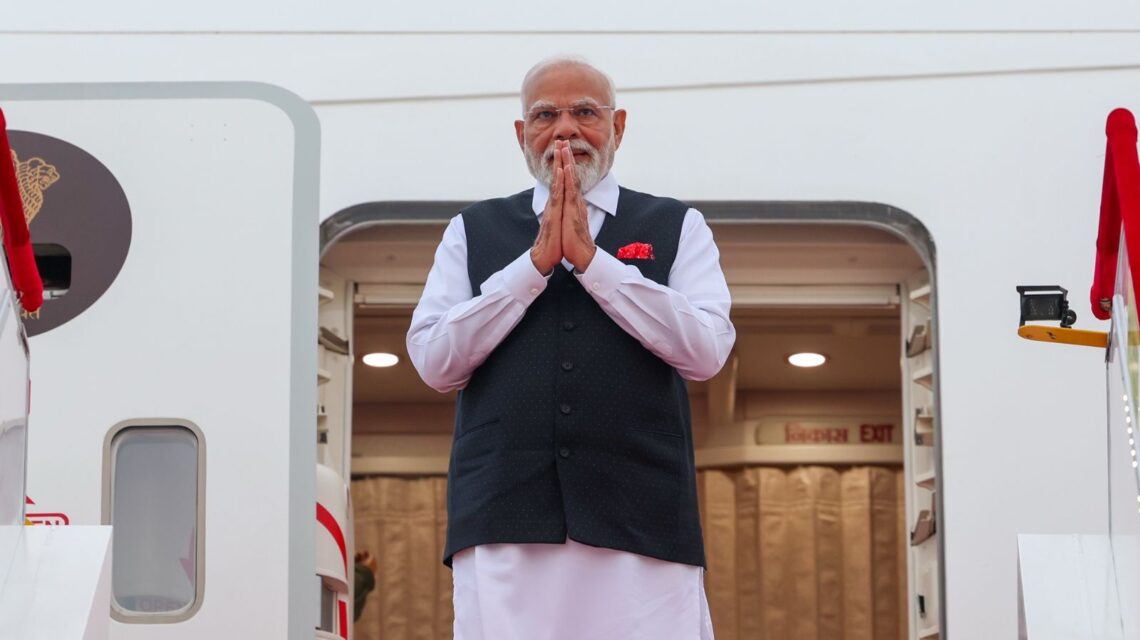Prime Minister Narendra Modi’s two-day visit to China marks a significant diplomatic effort amid rising tensions between India and China.
A Shift in India’s Diplomatic Approach Amid Rising Tensions
Prime Minister Narendra Modi’s two-day visit to China marks a significant diplomatic effort amid rising tensions between India and China. The visit comes as the two countries are locked in a bitter dispute over the Galwan Valley clashes in 2020.
Modi arrived in China on Saturday, beginning a two-day official visit to attend the Shanghai Cooperation Organisation (SCO) Summit. The visit is seen as a bid to strengthen ties with China and Russia, amidst the growing tensions. The SCO Summit is significant for India, particularly as it comes amid rising tensions between India and China, including the US imposing 50 per cent tariffs on Indian purchases of Russian crude oil.
At the same time, India’s engagement with the SCO has been a long-standing one. The country joined the grouping as a full member in 2017 after serving as an observer since 2005, and has played an active role in the organisation, holding key positions in the council.
By contrast, Modi’s visit to China marks his first trip to the country since the Galwan Valley clashes. The visit is seen as a diplomatic effort to ease tensions and pave the way for cooperation between the two nations.
During his previous visit to Japan, Modi highlighted the potential for cooperation between India and Japan in areas such as trade, innovation, and entrepreneurship. For now, it remains to be seen how much of this cooperation will translate to China.
Meanwhile, the SCO Summit is expected to be a major platform for Modi’s bilateral discussions with Chinese President Xi Jinping and Russian President Vladimir Putin. The summit sessions on August 31 and September 1 will also provide an opportunity for Modi to engage with other leaders from the SCO member countries.
For now, the visit marks a significant shift in India’s diplomatic approach towards China. By engaging with the SCO, India is seeking to strengthen its ties with Russia and China, amidst the growing tensions in the region.
The visit also comes as India seeks to balance its relationships with major powers, including the US, Japan, and China. The country’s engagement with the SCO is seen as a way to diversify its diplomatic efforts and reduce its dependence on any single nation.
India’s participation in the SCO has been driven by its desire to promote regional cooperation and security. The organisation has played a key role in promoting economic and cultural ties among its member countries, and India hopes to benefit from this cooperation.
The SCO Summit is also expected to address key issues such as counter-terrorism, cybersecurity, and energy security. India’s participation in these discussions is seen as an opportunity for the country to promote its interests and shape the regional agenda.
A Long-Standing Engagement
India’s engagement with the SCO has been a long-standing one. The country joined the grouping as a full member in 2017 after serving as an observer since 2005, and has played an active role in the organisation, holding key positions in the council.
The SCO has played a crucial role in promoting regional cooperation and security among its member countries. India hopes to benefit from this cooperation, particularly in areas such as counter-terrorism and energy security.
India’s participation in the SCO has also provided an opportunity for the country to engage with other major powers in the region, including Russia and China. The SCO Summit is expected to be a major platform for Modi’s bilateral discussions with Chinese President Xi Jinping and Russian President Vladimir Putin.
A Shift in India’s Diplomatic Approach
Modi’s visit to China marks a significant shift in India’s diplomatic approach towards the country. By engaging with the SCO, India is seeking to strengthen its ties with Russia and China, amidst the growing tensions in the region.
The visit also comes as India seeks to balance its relationships with major powers, including the US, Japan, and China. The country’s engagement with the SCO is seen as a way to diversify its diplomatic efforts and reduce its dependence on any single nation.
India’s participation in the SCO has been driven by its desire to promote regional cooperation and security. The organisation has played a key role in promoting economic and cultural ties among its member countries, and India hopes to benefit from this cooperation.
A New Era of Cooperation
Modi’s visit to China marks a significant moment in India’s diplomatic efforts to engage with the SCO. The visit is seen as a bid to strengthen ties with China and Russia, amidst the growing tensions in the region.
The SCO Summit is expected to be a major platform for Modi’s bilateral discussions with Chinese President Xi Jinping and Russian President Vladimir Putin. The summit sessions on August 31 and September 1 will also provide an opportunity for Modi to engage with other leaders from the SCO member countries.
For now, the visit marks a significant shift in India’s diplomatic approach towards China. By engaging with the SCO, India is seeking to strengthen its ties with Russia and China, amidst the growing tensions in the region.
India’s participation in the SCO has been driven by its desire to promote regional cooperation and security. The organisation has played a key role in promoting economic and cultural ties among its member countries, and India hopes to benefit from this cooperation.
The SCO Summit is also expected to address key issues such as counter-terrorism, cybersecurity, and energy security. India’s participation in these discussions is seen as an opportunity for the country to promote its interests and shape the regional agenda.
Stay connected with Indian Press Union for more updates.
This report has been curated and published by the Indian Press Union.

